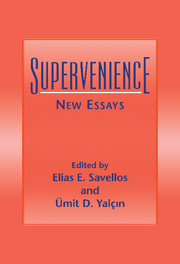Book contents
- Frontmatter
- Contents
- List of Contributors
- Introduction
- Varieties of Supervenience
- Supervenience: Model Theory of Metaphysics?
- “Global” Supervenient Determination: Too Permissive?
- Weak Supervenience Supervenes
- The Tweedledum and Tweedledee of Supervenience
- Reduction in the Mind of God
- Psychophysical Supervenience, Dependency, and Reduction
- Supervenience Redux
- Nonreducible Supervenient Causation
- Physicalism, Supervenience, and Dependence
- An Argument for Strong Supervenience
- Arguments for Supervenience and Physical Realization
- Supervenience and the Essences of Events
- How Does Ontology Supervene on What There Is?
- Supervenience and Intentionality
- Supervenience, Coherence, and Trustworthiness
- Does Truth Supervene on Evidence?
- Index
Supervenience and the Essences of Events
Published online by Cambridge University Press: 29 March 2010
- Frontmatter
- Contents
- List of Contributors
- Introduction
- Varieties of Supervenience
- Supervenience: Model Theory of Metaphysics?
- “Global” Supervenient Determination: Too Permissive?
- Weak Supervenience Supervenes
- The Tweedledum and Tweedledee of Supervenience
- Reduction in the Mind of God
- Psychophysical Supervenience, Dependency, and Reduction
- Supervenience Redux
- Nonreducible Supervenient Causation
- Physicalism, Supervenience, and Dependence
- An Argument for Strong Supervenience
- Arguments for Supervenience and Physical Realization
- Supervenience and the Essences of Events
- How Does Ontology Supervene on What There Is?
- Supervenience and Intentionality
- Supervenience, Coherence, and Trustworthiness
- Does Truth Supervene on Evidence?
- Index
Summary
Introduction
It is no secret that where A and B denote distinct types of properties, entities, or what have you, philosophers disagree as to what is precisely implied by the assertion that As supervene on Bs. On the other hand, there is general philosophical agreement that at the very core of this assertion is the idea of nonreducibility-cum-dependence: As' covariation with and dependence on Bs is consistent with their irreducibility to Bs. It is precisely this core feature of supervenience that looks attractive when we discuss the ontic status of events. It is well known that Donald Davidson formidably pioneered, and many after him pursued, the idea that events are best thought of as ontologically distinct, irreducible entities. The case for the dependence of events, on the other hand, may be easier to make. It suffices, for example, to go along with the currently popular view of events as instances of properties. If events are exemplifyings, as this account has it, then, clearly, there must be something that exemplifies, something on which events are, to some degree or other, dependent. The upshot of the combination of these ideas is that events and supervenience seem to be made for each other.
The issue of the supervenience of events has received its first, and to date only, systematic examination in Lawrence Lombard's Events: A Metaphysical Study. The account of event-supervenience of Events is important in many ways.
- Type
- Chapter
- Information
- SupervenienceNew Essays, pp. 244 - 263Publisher: Cambridge University PressPrint publication year: 1995



